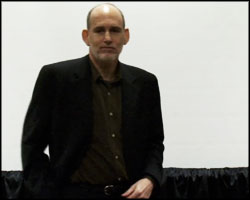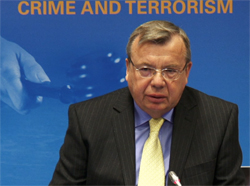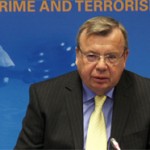DR2 Deadline den 2.6. 2011.
Ja til lovliggørelse af marihuana og hårde stoffer
Den globale krig mod hash og hårde stoffer er slået fejl, stofferne skal i langt højere grad lovliggøres;
sådan siger den såkaldte globale kommission om narko-politik .
Interview i studiet med Henrik Rindom, overlæge på psykiatrisk center i Hvidovre.
http://www.dr.dk/DR2/deadline2230/seudsendelser.htm#/10640
Den 2.6. 2011. Den Globale Commission on Drug Policy – har netop publiceret en rapport
der anbefaler verdens lande at slutte krigen mod stoffer og arbejde hen imod en statsregulering
af samtlige stoffer.
www.globalcommissionondrugs.org
Former Presidents of Brazil , Colombia , Mexico and Switzerland , Prime
Minister of Greece , Kofi Annan, Richard Branson, George Shultz, Paul
Volcker and Other Leaders Call for Major Paradigm Shift in Global Drug
Policy
The Commission of World Leaders Urges End to Failed Drug War,
Fundamental Reforms of Global Drug Prohibition Regime
Today the Global Commission on Drug Policy will release a groundbreaking
report at a press conference and tele-conference at the Waldorf Astoria Hotel
in New York City . The report condemns the drug war as a failure and
recommends major reforms of the global drug prohibition regime.
The Commission is the most distinguished group of high-level leaders to ever
call for such far-reaching changes – including not just alternatives to
incarceration and greater emphasis on public health approaches to drug use
but also decriminalization and experiments in legal regulation.
The Executive Director of the global advocacy organization AVAAZ, with its
nine million members worldwide, will present a public petition in support of the
Global Commission’s recommendations that will be given to the United
Nations Secretary General.
“Fifty years after the initiation of the UN Single Convention on Narcotic Drugs,
and 40 years after President Nixon launched the US government’s global war
on drugs, fundamental reforms in national and global drug control policies are
urgently needed,” said former president of Brazil Fernando Henrique
Cardoso. “Let’s start by treating drug addiction as a health issue, reducing
drug demand through proven educational initiatives and legally regulating
rather than criminalizing cannabis.”
The Commission’s recommendations are summarized in the Executive
Summary below this release. They include:
● End the criminalization, marginalization and stigmatization of people who
use drugs but who do no harm to others.
● Encourage experimentation by governments with models of legal regulation
of drugs (especially cannabis) to undermine the power of organized crime and
safeguard the health and security of their citizens.
● Ensure that a variety of treatment modalities are available – including not
just methadone and buprenorphine treatment but also the heroin-assisted
treatment programs that have proven successful in many European countries
and Canada.
● Apply human rights and harm reduction principles and policies both to
people who use drugs as well as those involved in the lower ends of illegal
drug markets such as farmers, couriers and petty sellers.
“Overwhelming evidence from Europe, Canada and Australia now
demonstrates the human and social benefits both of treating drug addiction as
a health rather than criminal justice problem and of reducing reliance on
prohibitionist policies,” said former Swiss president Ruth Dreifuss. “These
policies need to be adopted worldwide, with requisite changes to the
international drug control conventions.”
“We can no longer ignore the extent to which drug-related violence, crime and
corruption in Latin America are the results of failed drug war policies,” said
former Colombian president César Gaviria. “Now is the time to break the
taboo on discussion of all drug policy options, including alternatives to drug
prohibition.”
“The war on drugs has failed to cut drug usage, but has filled our jails, cost
millions in tax payer dollars, fuelled organized crime and caused thousands of
deaths. We need a new approach, one that takes the power out of the hands
of organized crime and treats people with addiction problems like patients, not
criminals,” said Richard Branson, founder of the Virgin Group and cofounder
of The Elders, United Kingdom. “The good news is new approaches focused
on regulation and decriminalization have worked. We need our leaders,
including business people, looking at alternative, fact based approaches. We
need more humane and effective ways to reduce the harm caused by drugs.
The one thing we cannot afford to do is to go on pretending the “war on drugs”
is working.”
Commission Members (Those appearing at June 2 press conference are
italicized and those who are also speaking are underlined):
Kofi Annan, former Secretary General of the United Nations,
Ghana
Louise Arbour, former UN High Commissioner for Human
Rights, president of the International Crisis Group, Canada
Richard Branson, entrepreneur, advocate for social causes,
founder of the Virgin Group, cofounder of The Elders, United
Kingdom
Fernando Henrique Cardoso, former President of Brazil
(chair)
Marion Caspers-Merk, former State Secretary at the
German Federal Ministry of Health
Maria Cattaui, Petroplus Holdings Board member, former
Secretary-General of the International Chamber of Commerce,
Switzerland
Ruth Dreifuss, former President of Switzerland and Minister
of Home Affairs
Carlos Fuentes, writer and public intellectual, Mexico
César Gaviria, former President of Colombia
Asma Jahangir, human rights activist, former UN Special
Rapporteur on Arbitrary, Extrajudicial and Summary Executions,
Pakistan
Michel Kazatchkine, executive director of the Global Fund to
Fight AIDS, Tuberculosis and Malaria , France
Mario Vargas Llosa, writer and public intellectual, Peru
George Papandreou, Prime Minister of Greece
George P. Shultz, former Secretary of State , United States
(honorary chair)
Javier Solana, former European Union High Representative
for the Common Foreign and Security Policy , Spain
Thorvald Stoltenberg, former Minister of Foreign Affairs and
UN High Commissioner for Refugees, Norway
Paul Volcker, former Chairman of the United States Federal
Reserve and of the Economic Recovery Board
John Whitehead, banker and civil servant, chair of the World
Trade Center Memorial Foundation, United States
Ernesto Zedillo, former President of Mexico
EXECUTIVE SUMMARY
The global war on drugs has failed, with devastating consequences for
individuals and societies around the world. Fifty years after the initiation of the
UN Single Convention on Narcotic Drugs, and 40 years after President Nixon
launched the US government’s war on drugs, fundamental reforms in national
and global drug control policies are urgently needed.
Vast expenditures on criminalization and repressive measures directed at
producers, traffickers and consumers of illegal drugs have clearly failed to
effectively curtail supply or consumption. Apparent victories in eliminating one
source or trafficking organization are negated almost instantly by the
emergence of other sources and traffickers. Repressive efforts directed at
consumers impede public health measures to reduce HIV/AIDS, overdose
fatalities and other harmful consequences of drug use. Government
expenditures on futile supply reduction strategies and incarceration displace
more cost-effective and evidence-based investments in demand and harm
reduction.
Our principles and recommendations can be summarized as follows:
End the criminalization, marginalization and stigmatization of people who use
drugs but who do no harm to others. Challenge rather than reinforce common
misconceptions about drug markets, drug use and drug dependence.
Encourage experimentation by governments with models of legal regulation of
drugs to undermine the power of organized crime and safeguard the health
and security of their citizens. This recommendation applies especially to
cannabis, but we also encourage other experiments in decriminalization and
legal regulation that can accomplish these objectives and provide models for
others.
Offer health and treatment services to those in need. Ensure that a variety of
treatment modalities are available, including not just methadone and
buprenorphine treatment but also the heroin-assisted treatment programs that
have proven successful in many European countries and Canada. Implement
syringe access and other harm reduction measures that have proven effective
in reducing transmission of HIV and other blood-borne infections as well as
fatal overdoses. Respect the human rights of people who use drugs. Abolish
abusive practices carried out in the name of treatment – such as forced
detention, forced labor, and physical or psychological abuse – that contravene
human rights standards and norms or that remove the right to selfdetermination.
Apply much the same principles and policies stated above to people involved
in the lower ends of illegal drug markets, such as farmers, couriers and petty
sellers. Many are themselves victims of violence and intimidation or are drug
dependent. Arresting and incarcerating tens of millions of these people in
recent decades has filled prisons and destroyed lives and families without
reducing the availability of illicit drugs or the power of criminal organizations.
There appears to be almost no limit to the number of people willing to engage
in such activities to better their lives, provide for their families, or otherwise
escape poverty. Drug control resources are better directed elsewhere.
Invest in activities that can both prevent young people from taking drugs in the
first place and also prevent those who do use drugs from developing more
serious problems. Eschew simplistic ‘just say no’ messages and ‘zero
tolerance’ policies in favor of educational efforts grounded in credible
information and prevention programs that focus on social skills and peer
influences. The most successful prevention efforts may be those targeted at
specific at-risk groups.
Focus repressive actions on violent criminal organizations, but do so in ways
that undermine their power and reach while prioritizing the reduction of
violence and intimidation. Law enforcement efforts should focus not on
reducing drug markets per se but rather on reducing their harms to
individuals, communities and national security.
Begin the transformation of the global drug prohibition regime. Replace drug
policies and strategies driven by ideology and political convenience with
fiscally responsible policies and strategies grounded in science, health,
security and human rights – and adopt appropriate criteria for their evaluation.
Review the scheduling of drugs that has resulted in obvious anomalies like
the flawed categorization of cannabis, coca leaf and MDMA. Ensure that the
international conventions are interpreted and/or revised to accommodate
robust experimentation with harm reduction, decriminalization and legal
regulatory policies.
Break the taboo on debate and reform. The time for action is now.





